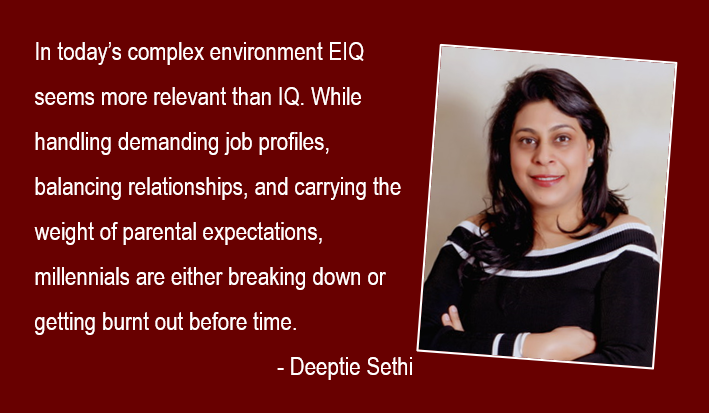Let’s face it, overemphasis on Intelligence Quotient (IQ) is a passé. Most successful people from different walks of life can tell you stories about how they prioritized Emotional Intelligence Quotient (EIQ) over IQ to achieve efficiency. Especially for the millennials, EIQ seems more relevant than IQ in today’s complex environment. They have student loans, bigger ambitions, performance pressure, peer pressure and to make matters worse, threats of job, instability and unemployment are at an all-time high. While handling demanding job profiles, balancing relationships, and carrying the weight of parental expectations, millennials are either breaking down or getting burnt out before time.
What’s bothering the millennials?
Because the schools didn’t teach EIQ, families didn’t adapt it and society didn’t embrace it, most millennials even while dealing with disconnection, financial stress, anxiety and cognitive overload remain clueless about what’s wrong. Frankly, young guns don’t have any time to think for themselves and easily lose a sense of purpose. Their credibility takes a toll. And when that happens, their performance also suffers.
EI becomes the differentiator when IQ is a given
So, what’s the solution? The answer is a greater focus on EIQ. It works wonder in helping people perform better, live fulfilled lives, achieve financial stability and be more compassionate. Those with high EI rarely push the panic button in crunch situations. While millennials are yet to attach great importance to it, seasoned managers have understood the vital role it plays. A survey of 450 HR leaders done by Korn Ferry, a global organizational consulting firm, found that 92% see EI extremely crucial in a globalizing economy. In fact, when IQ and technical skills are similar, EI becomes an important differentiator.
Mentors can be the guide in your emotional journey
The EI revolution is taking shape but an uncertain future can scare people. Therefore, they need the guidance of the ‘been there, done that’ lot. A mentor can assist to tackle mounting problems as people with low EI lack confidence and clarity, don’t trust their potential, and struggle to cultivate meaningful relationships. Enhancing EI competencies will not only improve performance at the current job but also serve the mentees in their careers for a lifetime. Mentoring relationship let people express and explore more and shun patterns that prevent them from reaching personal greatness. Nikhil Dey, PR and communication veteran and a CompliMentor during ‘Talk It Out’, lives session with me highlighted an important point. He said, “The intent with which a mentor and mentee approach something is highly powerful and that makes the relationship transformational and not transactional.”
Not just for newcomers, it works for a better Mentor-Mentee Relationship
Daniel Goleman in his seminal book, ‘Emotional Intelligence: Why It Can Matter More Than IQ’ stated that EI abilities like self-management, empathy and social skills separate the most successful leaders from the average ones and especially for higher-level executives and, the determiner is how they manage their relationships with others. Times have changed. Professional servitude is no longer cool. Millennials challenge the calls of their seniors without fear of getting fired. Therefore, business leaders today need to lead with compassion, empathy and mutual respect. A mentor and leader’s EQ can significantly impact workplace culture.
Soul-searching doesn’t sound easy. Mentoring is transformational?
EI is not merely introspection. Through mentoring, a person gets more aligned with their life goals while developing a perspective beyond self-interest. A channel of two-way communication can help eliminate doubts, enhance interpersonal growth and build a positive outlook. We face many challenges on personal, professional, social, and global fronts and managing emotions sounds easier than it is. You can learn from someone’s experience who knows how to successfully navigate through the maze of different feelings without going into a denial mode.
A pandemic like Covid-19 has changed the rules of how we function and only by nurturing greater Emotional Intelligence Quotient we can build ourselves personally and professionally for the long haul.
The views and opinions published here belong to the author and do not necessarily reflect the views and opinions of the publisher.



Be the first to comment on "Why millennials should meet a mentor who can elevate their Emotional Intelligence?"